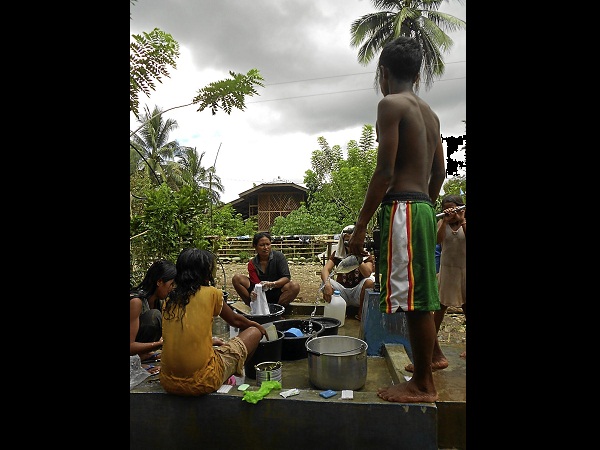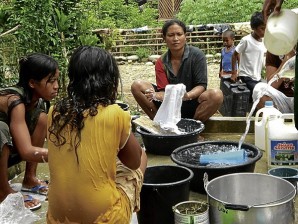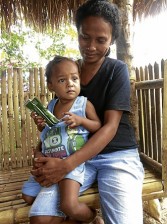SAM, hunger food alone can’t cure

THE AVAILABILITY or absence of potable drinking water spells life and death in some communities, like in this neighborhood in Buda, Davao City. GERMELINA LACORTE/INQUIRER MINDANAO
Doctors and nurses still remember the first night when a 1-year-old Matigsalog girl, Mellay Dumakatar, arrived at German Doctors’ Hospital here, diagnosed with a severe case of diarrhea.
“She never cried,” recounted Dr. Gabriel Von Wahlert, a German doctor volunteer specializing in obstetrics and gynecology, who also trained in psychosocial management. “She hardly uttered a sound, and the mother, she looked withdrawn and very upset, probably sensing she could no longer keep her child,” she recalled.
Hearing a voice
It was only four days later when Von Wahlert heard the girl making gurgling sounds, and later, crying. “Oh, she has a voice after all, and that was very nice to hear,” Von Wahlert said.
At 4.75 kilograms, Mellay was diagnosed with severe acute malnutrition (SAM), a debilitating “hunger” disease that remains a worldwide concern because it could stunt the growth and even cause the death of young children.
Article continues after this advertisementMellay was one of four SAM cases treated at German Doctors’ Hospital in August this year, said German Doctors Hospital nurse Mia Gerigdig. Health statistics show that SAM still afflicts 7.3 percent of (or nearly a million) Filipino children under five.
Article continues after this advertisementDeadly silence
One knows a child suffers from severe acute malnutrition when the child can’t cry or laugh anymore, according to Dr. Oscar Fudalan, program head for nutrition of the Action against Hunger, known internationally as Action Contre la Faim or ACF International.
“They stop playing,” he said.
Fudalan said contrary to what most people think, simply giving sick children food would not help anymore.
“Because most of their organs have already ceased to function and their bodies could no longer absorb the food,” he said.
Milk for cure

FAMILIES in poor communities, like here in Buda, Davao City, normally can’t afford to have individual water connections, prompting them to share in the use of sources of water. GERMELINA LACORTE/INQUIRER MINDANAO
ACF International is one of the first humanitarian organizations to bring the integrated management for acute malnutrition (IMAM) treatment for children suffering from severe acute malnutrition in the towns of Arakan and President Roxas in North Cotabato, and Kapatagan in Lanao del Sur, sites of its “Convenio” program supporting the socioeconomic development of communities within the action zones of the Spanish Development Cooperation in the Philippines.
Introduced for the first time in the Philippines in 2008 by the international group Medicins sans Frontieres (Doctors Without Borders) in eight sites in Maguindanao, the treatment starts with giving sick children therapeutic milk formula in place of food.
The treatment came amid massive evacuations that led to a humanitarian crisis in Central Mindanao. It was implemented later by the international groups Save the Children and ACF International.
Peanut butter
As their appetite and body metabolism improved, sick children move on to a peanut butter-tasting paste, aptly called Eeezee Paste, as they continue treatment at home until they recover.
From Jan. to July 26 this year alone, ACF International found at least 67 cases of severe acute malnutrition and 238 moderate cases among children screened in President Roxas town in North Cotabato, one of its project areas; 109 cases of severe acute malnutrition and 348 moderate cases in Arakan, North Cotabato, and 59 cases of severe acute malnutrition and 120 moderate ones in Kapatagan, Lanao del Sur.
Using the IMAM protocol, 89 percent of these cases had been treated successfully, an ACF International report said.
Vulnerable
In its overview of acute malnutrition situation in the Philippines, ACF International cited the World Health Organization’s threshold for global malnutrition.
“If not properly managed, children with severe acute malnutrition are 9.4-times more likely to die than normal children,” the program report said.
Most cases of severe acute malnutrition in ACF International sites are usually referred to ACF International’s partner hospitals, which include Dr. Serapio Montañer Memorial Hospital in Malabang, Lanao del Sur, and the Maranao Peoples Development Center Inc. (Maradeca) in Marawi City.
The German Doctors Hospitals serve the Arakan and President Roxas areas.

A child is on the way to recovery after suffering from severe malnutrition. GERMELINA LACORTE/INQUIRER MINDANAO
But Fudalan said IMAM, a health protocol adopted by the Department of Health, is only one component in addressing severe malnutrition in areas where the Convenio program is being implemented.
“For rural communities, it is critical that they have access to food, water and livelihood to curb the hunger problem,” he said.
Violence equals hunger
Fudalan said those involved in the program need to adopt an integrated approach to combat hunger, which requires not only curing children with severe malnutrition but also helping communities develop sources of food, potable water and build sanitation facilities.
To make the program more sustainable, program personnel added a “good governance” component, treating local governments as “partners” and making them accountable for the health and well-being of their people.
Fudalan said the Philippines may not be one of the countries where the alarm bells are not yet ringing over severe acute malnutrition cases. Troubling cases of malnutrition, however, are found in areas wracked by armed conflict, Fudalan said.
“Intermittent conflicts not only threaten to displace people but also affect their food security because sometimes, out of fear, they could no longer go out to their farms to work, so the communities end up with having no food to eat,” he said.
Signs of progress
Arakan town has consistently posted the highest incidence of malnutrition in North Cotabato for several years before the project began. But its local government has also started a sustainable agriculture project, tapping indigenous rice varieties.
The Convenio program has already led to the installation of potable water systems and sanitation facilities in the Arakan barangays of Ganatan and Tumanding, and the President Roxas barangays of Datu Sundungan and Lama Lama. They had also been installed in Barangays Datu Inda and Bato Bato in President Roxas, and Maria Caridad in Arakan.
“In some communities, basic facilities or the absence of these can already spell life and death,” said Fudalan. Before potable water came to Barangay Ganatan, the village has seen a high number of deaths because of diarrhea.
48 siblings
The child Mellay was first given the F75 treatment. After one-and-a-half weeks, she started to regain her appetite and moved on to F100 treatment. Health workers are looking forward to the day that she will be strong enough to go home. But Mellay came from Sinuda’s Barangay Kabalansian in the boundary of Kitaotao, Bukidnon, which is not in ACF International’s program site.
Apart from the lack of potable water and sanitation facilities that might have caused her diarrhea in the first place, health workers are also worried about the child’s circumstances at home. Mellay has 48 other siblings. Her father, Nawon Dumakatar, 56, has seven wives.